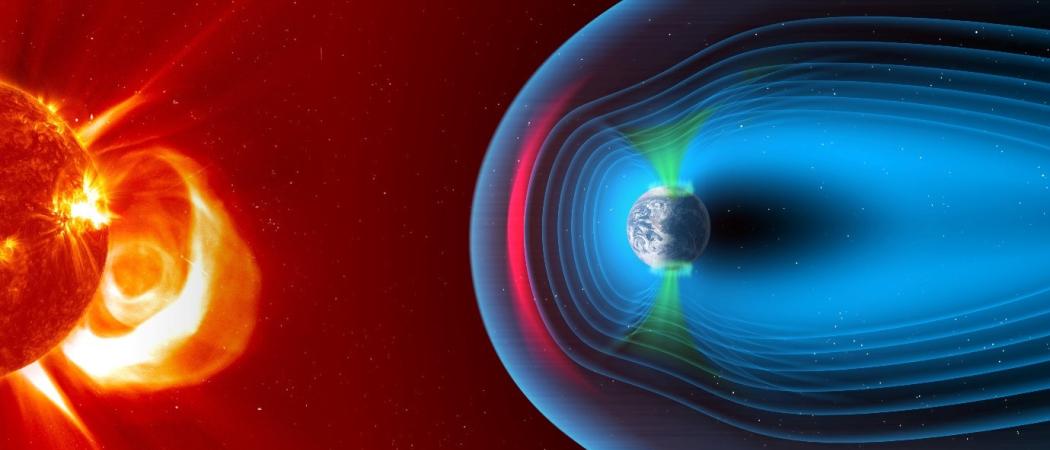
The SMILE mission. Photo: European Space Agency
SMILE, a new space mission to study the impact of the solar wind on the Earth's magnetic environment, has been incorporated in the European Space Agency (ESA) Cosmic Vision programme and received additional funding from the UK Space Agency.
Jointly developed by ESA and the Chinese Academy of Sciences with major UK involvement from UCL, SMILE (Solar wind Magnetosphere Ionosphere Link Explorer) will explore scientifically what drives space weather and provide valuable knowledge that will eventually help mitigate its effects.
In particular, the SMILE mission will study how the solar wind interacts with the Earth's magnetosphere, which can impact on satellites, power grids and communications networks integral to our modern lives.
Professor Graziella Branduardi-Raymont, SMILE mission Co-Principal Investigator at UCL Mullard Space Science Laboratory, said: “Space weather remains one of the biggest risks facing humanity and SMILE will make a fundamental contribution in furthering our scientific understanding to help mitigate its impact. I am thrilled that we have achieved this significant milestone in the development of SMILE and the mission is now incorporated in the ESA Cosmic Vision programme.
“This is a crucial step for the UK institutes collaborating to make SMILE a success, and in particular its Soft X-ray Imager which is led by the University of Leicester, as adoption by ESA is a necessary step to secure funding from the UK Space Agency to support the development of SMILE to launch in 2023.”
Additional funding worth £7 million was announced today by Science Minister Chris Skidmore to ensure UK scientists play a leading role in this new space weather science mission.
The funding will be used to develop a Soft X-ray Imager (SXI) instrument, being led by the University of Leicester, with scientific mission leadership at UCL Mullard Space Science Laboratory, and support from the Open University, ahead of launch in 2023.
Professor Paul Monks, Pro-Vice-Chancellor and Head of College of Science and Engineering, University of Leicester, said: “We are delighted to be leading the development of the SXI instrument at the University of Leicester, building on our long heritage of cutting-edge space research and instrumentation.
“SXI will be the first instrument to provide true global imaging of the solar wind exchange process within the magnetosphere. The results of which will have meaningful implications for safeguarding our environment on Earth.”
Rare extreme space weather could disrupt modern technology by causing geomagnetic storms affecting satellite navigation, shortwave communications and power grids. A recent ESA study estimated the potential socio-economic impact in Europe from a single, extreme space weather event could reach €15 billion. Much of this disruption could be avoided through accurate forecasting.
The new funding from the UK Space Agency brings the total UK investment in the SMILE instruments to £10 million and will build on the significant expertise found in universities across the country in the design and development of cutting-edge space science.
The Science Minister also announced the UK’s agreement with partners including the European Space Agency in a second mission, called Planetary Transits and Oscillations of stars (PLATO), which is scientifically led by the University of Warwick and will search for Earth-like planets orbiting alien stars.
Science Minister Chris Skidmore said: “These two exciting space missions are brilliant examples of the UK’s space industry’s innovation and expertise.
“Space weather – such as solar wind – is a potential threat to our communications systems here on Earth so this research examining how the wind interacts with our planet’s electromagnetic system is important. Meanwhile, work to discover Earth-like planets around other stars may eventually lead to us answering the question of whether extra-terrestrial life exists.”
National funding for these missions is in addition to the UK’s regular contributions to the European Space Agency’s science programme.
Chris Lee, Chief Scientist at the UK Space Agency, said: “The UK’s involvement in the instruments onboard both of these missions underpins our separate industrial investment in SMILE and PLATO through our ongoing membership of the European Space Agency.
“SMILE is a prime example of scientific innovation underpinning the broader economy with real-world applications while PLATO’s innovative design is a game changer in Exoplanet science and our investment will ensure UK scientists and engineers will be leading participants in all aspects of the mission.”
Read more:
- The SMILE mission
- The UK Space Agency
- Professor Graziella Branduardi-Raymont's academic profile
- UCL Space & Climate Physics
- UCL Mullard Space Science Laboratory
- UCL Mathematical & Physical Sciences
This release was first published 8 March 2019 by University College London.





 A unique international forum for public research organisations and companies to connect their external engagement with strategic interests around their R&D system.
A unique international forum for public research organisations and companies to connect their external engagement with strategic interests around their R&D system.